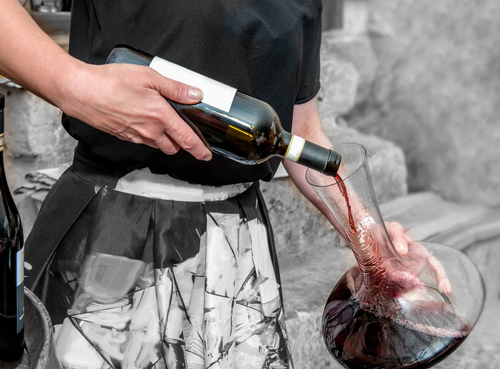Decanting Wine

Hey wine friends!
Let’s talk a little bit about decanting wine. Many questions that I get around this topic have to do with why do you decant? Which wines do you decant? And how long do you decant?
I personally don’t use a decanter very often. One of the issues that I have with decanting is that the decanter is hard to clean. When you keep it on your shelf it tends to collect some dust and then when you wash it, you get lots of drops and it’s not an easy thing to clean. So, if you are going to be decanting wine often, you might want to invest in one of those little brushes that goes inside and cleans it out nicely because a decanter looks nice when it’s super clean and clear.
Why would you decant wine? There’s a couple of reasons.
First and foremost, the most important reason is to remove or to help keep the sediment out of your glass. When you’re pouring your wine, especially an older wine, sometimes sediment forms in the bottom of the bottle. The best way to get rid of that would be to sit the bottle upright, so have it sitting on your counter for a day or two before you’re going to serve it and use a decanter. So, as you’re pouring the wine into the decanter, you can see when the sediment, the color of the wine changes, and you can see the sediment start to come out. At that point, stop pouring it and you will save yourself from having that sediment in the glass.
It’s also to be noted that sediment is not a bad thing. It’s a natural process that occurs in wine, so don’t get grossed out or think that there’s something wrong with the wine, but it can be unpleasant to get a bit of it in your mouth. So removing it through decanting is one of the most important reasons to use a decanter.
The other reason to decant wine would be to open it up. When we talk about a closed wine, it basically means that you’re not getting the bouquet, so the aromas are not coming through and the tannins are very tight. That typically happens with younger wines. So I think it’s a common misnomer that you only use a decanter for older wines. That might have something to do with the sediment thing that I just talked about. But when we’re talking about younger wines and particularly highly tannic wines, like Nebbiolo based wines. Decanting can really help with the process of opening it up. So giving you the opportunity to experience the full bouquet and all of the beautiful aromas that come from a wine. They are released through the introduction of oxygen. So as we swirl our wine in our wine glass to open it up, you can also use a decanter to do that.
The type of wine that you would normally use a decanter for would be Reds. Not very important usually to use it for white wines and you certainly don’t want to use it for sparkling wines because it would help to dissipate the perlage, the bubbles. So it’s typically used for red wines, and again, younger red wines that need some help to open up. The lighter-bodied wines like Pinot Noir, for example, would not need a lot of time in a decanter maybe minutes or so. But as you step it up and you go to a more full-bodied Cabernet, you know Syrah, things like that, you would want to maybe decant for an hour or two. When you’re talking about some of the biggest, boldest wines in Italy, a Barolo, a Barbaresco, a Sagrantino, which is a very tannic wine, the decanting process can be very helpful to do that, to help open it up and prepare it for your guests.
There’s also of course the romantic or emotional side to decanting particularly when you’re in a restaurant and you order an important bottle of wine. When the sommelier comes to the table and asks if you’d like to decant it, if you’re on a date I highly recommend that you say yes because it just is an emotional and beautifully romantic process that aids in the beauty of the wine that you’re going to be drinking.
Again, for the most part, it’s to remove sediment, to open up the wine, or just to make it feel even more special than it already is.
I hope that answers everybody’s questions about decanting! Thanks again and ciao for now!

